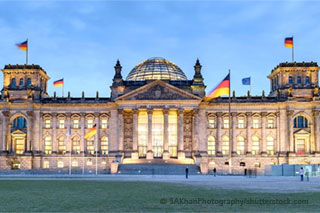On 26 September 2021, voters will decide which parties can form the German federal government in the future. This election is a special one: After four legislative periods with Angela Merkel, Germany will elect a new chancellor. For the Bundestag election, the University of Cologne has put together a "special" with contributions that explainsbackgrounds and clarify contexts in text, audio and video contributions.
Experts from political science, social psychology, economics and media culture studies have their say on the website: on the political situation after the Merkel era, on tax issues, on language in politics and the possible effects of conspiracy theories on democracy.
WiSo professor Thomas Jäger, the holder of the Chair of International Politics and Foreign Policy at the WiSo Faculty of the University of Cologne, classifies Angela Merkel's chancellorship in the interview and says about her, among other things: "She became the chancellor of careful, small, fumbling steps of action, always careful not to do anything fundamentally wrong that could be credited to her and to shield anything that went wrong from public attention." Professor Jäger also explains what key national and international tasks await her successor.
Tax plans of political parties are a topic that is generally frequently addressed in the run-up to elections. Professor Dr Felix Bierbrauer is Professor of Economics and holds the WiSo-Chair of Public Economics at the University of Cologne. Together with Andreas Peichl (Ifo Institute and LMU Munich), Dominik Sachs (University of St. Gallen) and Daniel Weishaar (Ifo Institute and LMU Munich), he analysed which income tax reforms in Germany would increase welfare and be politically feasible.
Social psychologist Professor Dr Joris Lammers from the Cluster of Excellence ECONtribute comments on various aspects of language in politics and shows in his research that it is no coincidence that conservative voters respond to past-oriented election advertising.
Professor Dr Stephan Packard, Chair of Cultures and Theories of the Popular, comments on the role of social media as well as possible electoral influence. On the possible impact of conspiracy theories on democracy, he says, among other things: "Conspiracy theories are particularly conspicuous symptoms of a much broader decline in trust in public institutions and in journalism."
- Special on the federal election on 26 September
- Find an Expert pages of
